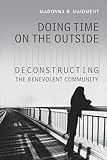Doing Time on the Outside : Deconstructing the Benevolent Community / MaDonna R. Maidment.
Material type: TextPublisher: Toronto : University of Toronto Press, [2006]Copyright date: ©2006Description: 1 online resource (192 p.)Content type:
TextPublisher: Toronto : University of Toronto Press, [2006]Copyright date: ©2006Description: 1 online resource (192 p.)Content type: - 9780802093899
- 9781442674011
- 365.6082097
- online - DeGruyter
| Item type | Current library | Call number | URL | Status | Notes | Barcode | |
|---|---|---|---|---|---|---|---|
 eBook
eBook
|
Biblioteca "Angelicum" Pont. Univ. S.Tommaso d'Aquino Nuvola online | online - DeGruyter (Browse shelf(Opens below)) | Online access | Not for loan (Accesso limitato) | Accesso per gli utenti autorizzati / Access for authorized users | (dgr)9781442674011 |
Browsing Biblioteca "Angelicum" Pont. Univ. S.Tommaso d'Aquino shelves, Shelving location: Nuvola online Close shelf browser (Hides shelf browser)

|

|

|

|

|

|

|
||
| online - DeGruyter Divine Dialectic : Dante's Incarnational Poetry / | online - DeGruyter Documenting a Province/Chronique d'une province : The Archives of Ontario at 100/le centenaire des Archives publiques d'Ontario / | online - DeGruyter Doing Medicine Together : Germany and Russia Between the Wars / | online - DeGruyter Doing Time on the Outside : Deconstructing the Benevolent Community / | online - DeGruyter Dolls of Canada : A Reference Guide / | online - DeGruyter Downsizing in Academic Libraries : The Canadian Experience / | online - DeGruyter Downtown Canada : Writing Canadian Cities / |
restricted access online access with authorization star
http://purl.org/coar/access_right/c_16ec
Criminalized women are the focus of great interest in contemporary sociological research all over the world, however much of the growing body of work in this area has focused on the prison. Considerably less attention has been paid to women serving their sentences in the community.Doing Time on the Outside fills a gap in the research by focusing on the experiences of women on conditional release, and attempting to understand how some criminalized women avoid going back into custody given the many challenges they face. Using data collected in a series of interviews, MaDonna R. Maidment identifies four major factors characterizing women?s attempts at re-integration. First, the fewer ?layers of social control? a woman lived under prior to her prison term, the greater her chances of staying out of prison. Those women accustomed to a lifetime of formal social controls are vulnerable and largely dependent on continued intervention. Second, women?s own accounts of their success do not coincide with official definitions. For many women who have spent their lives being controlled by state agencies, managing a relatively short period of independence in the community marks a major milestone. Third, for those women who have managed to stay out of the criminal justice system, a majority remain tightly entangled in other state-sponsored control regimes, where patterns of dependency, medicalization, and infantilization still persist in the treatment of women. Fourth and finally, familial and social support networks are paramount to women?s successful re-integration, far more so than professional supports provided by state and community agencies. Maidment?s important findings have significant implications: they beg us to re-examine how our society processes criminalized women, and to call into question well-entrenched contemporary policies, which have failed to account for the economic, social, and cultural realities of women?s lives.
Mode of access: Internet via World Wide Web.
In English.
Description based on online resource; title from PDF title page (publisher's Web site, viewed 01. Nov 2023)


